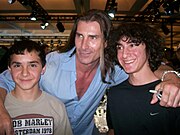Design
Design
Personality
Chart Properties
Your Cross represents the specific theme of your life. This cross embodies your unique potential & the lessons you're here to learn, providing a roadmap to fulfilling your life purpose.
We use the UTC birth time and date to do the calculations required to generate your Human Design chart.
Buy Tokens
Pay as you use, no expiry and no subscription required.Prompt Ideas
Get inspired with some epic prompt ideas.Bill Bradley's Biography
American politician, a former basketball star. While playing college ball, he was generally considered too slow – but he ended up in the Basketball Hall of Fame. As a politician, he may be regarded as too plodding and too pure. Yet it was he who first put tax reform on the national agenda, back in 1982 as a first-term Democratic Senator from New Jersey. He kept plugging away in his dogged fashion, even publishing a book, “The Fair Tax.”
A former Rhodes scholar, Bradley always had a sense of where he wanted to go, and once setting a goal, persistently and patiently achieved it. As a high school basketball player in Crystal City, MO, he practiced over three hours a day with lead weights in his sneakers. As a Princeton star, he awed classmates by pumping in 30 points a game and then hitting the library until midnight. As a Senator, he slightly unnerved some of his colleagues by relentlessly writing in a small notebook that he kept in his inside jacket pocket.
The son of a banker who was a Republican, Bradley grew up in a suburb of St. Louis showing an independent streak from youth, a proclivity for hard work and a thirst for perfection. By his junior year he was 6′ 5″ and hotly sought after for basketball. He was also a straight-A student. While working the summer of 1964 on Capitol Hills, his interest in politics was ignited. When he finished Princeton, virtually everyone advised him to play pro ball, but he turned down a contract in favor of a Rhodes scholarship in England. Only after his two years at Oxford were completed did he sign with the Knicks, becoming the highest-paid basketball player in the world. When he retired in 1977 with two championship rings, Bradley went for a Senate seat in New Jersey.
Bradley’s interest in tax reform began with his own experience. When he had reached the six-figure income mark as a sports star, he found that he was a depreciable asset, and in his own typical fashion, began to study heavy economic tomes to explain his position. As his starring role in tax reform illustrates, Bradley plays politics as he played basketball. He never lets up.
He was re-elected to a second Senate term in 1984 and is one of the most popular politicians in New Jersey history. Friendly with his colleagues, he remained distant, passing up Washington’s social scene and eating a salad alone at his desk for lunch.
A voracious reader and a rumpled dresser, Bradley has a former athlete’s disdain for exercise as well as a fondness for junk food that predictably added a few pounds in his 40’s. He enjoys being unpredictable but would also enjoy being less wooden in his speeches, which he writes himself. Though he may appear standoffish, he jokes easily with voters and has a wry sense of humor. In an era of slick politicians, his very plainness is refreshing. Some call Bradley a plodder. He never acts rashly but orients himself on issues before taking a stand. In Senate parlance, he is a work horse, not a show horse. But once committed, Bradley acts boldly. He is permissive on social issues such as abortion, supportive of women’s right and concerned about pollution.
A devoted family man, Bradley is married to Ernestine, a professor of comparative literature at Montclair; they have a daughter, Theresa Anne, born in 1977. He was supportive of Ernestine through her battle with breast cancer in 1992, finding the struggle a transforming experience for himself.
On 4/02/1990, still a young man in political terms, he announced that he was running for his third six-year-term in the U.S. Senate. Bradley is known for being concentrated, disciplined and polite. After 17 years on Capitol Hill, the New Jersey Democratic Senator announced on 8/16/1995 that he was retiring, calling the U.S. political system “broken.” He was worn out by the need to spend so much time raising money, and under whelmed by the idea of working as a member of the minority fighting the new conservatism. He plans to remain in the public arena in some capacity, perhaps a third-party presidential candidate or as a cerebral pathfinder outside the system.
His first book, “Life on the Run” was not so much a sports book as the rumination of an innately private person who had to experience an unwanted degree of fame in order to do something he loved. His latest book (1996) is an exceptional memoir about growing up in Missouri, going to Princeton, and, above all, serving in the Senate, “Time Present, Time Past.” Intelligent, surprisingly candid and exceptionally well written, it is a love letter to American from one who is aware of the country’s weaknesses and contradictions, but is still optimistic about the future.
On 12/11/1998, Bradley announced on his website that he was exploring a run for the 2000 Democratic nomination. He made his first trip to New Hampshire as an announced candidate the last week of January 1999.
Link to Wikipedia biography
Link to Astrodienst discussion forum
Bill Bradley
Your Cross represents the specific theme of your life. This cross embodies your unique potential & the lessons you're here to learn, providing a roadmap to fulfilling your life purpose.
We use the UTC birth time and date to do the calculations required to generate your Human Design chart.






